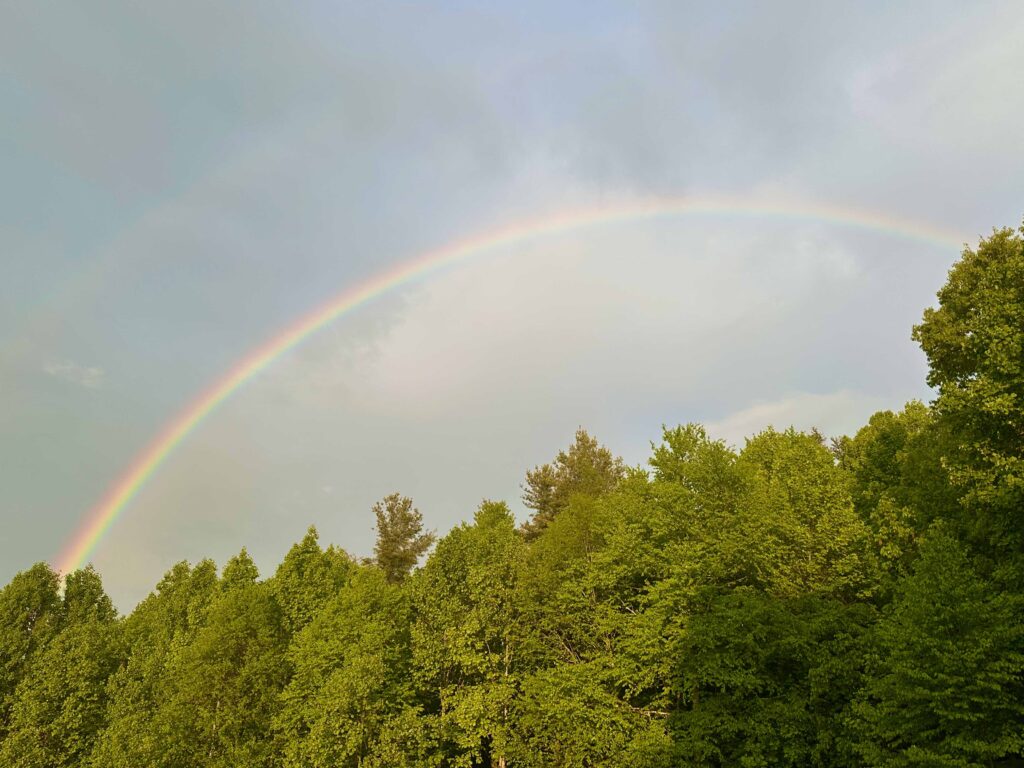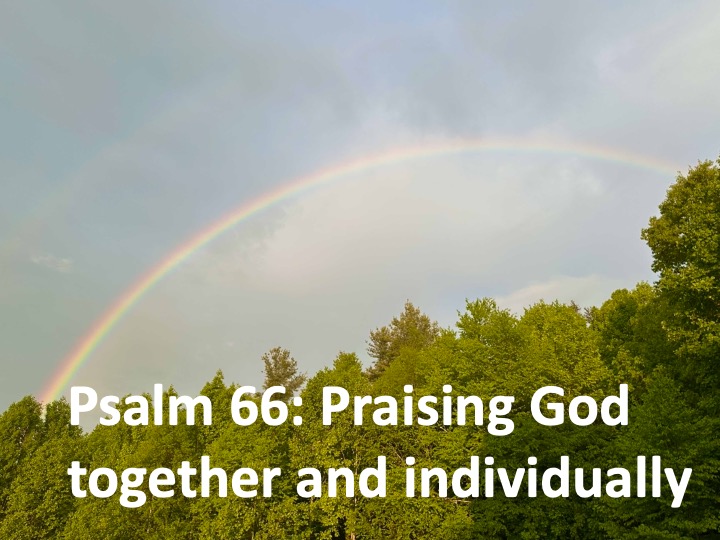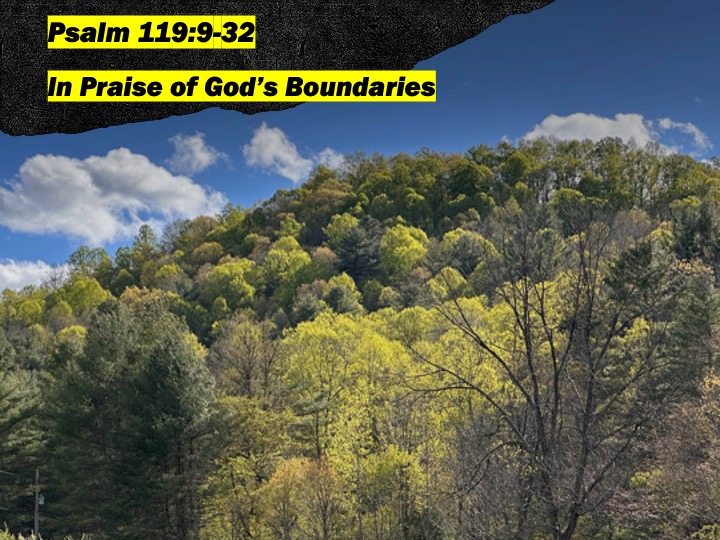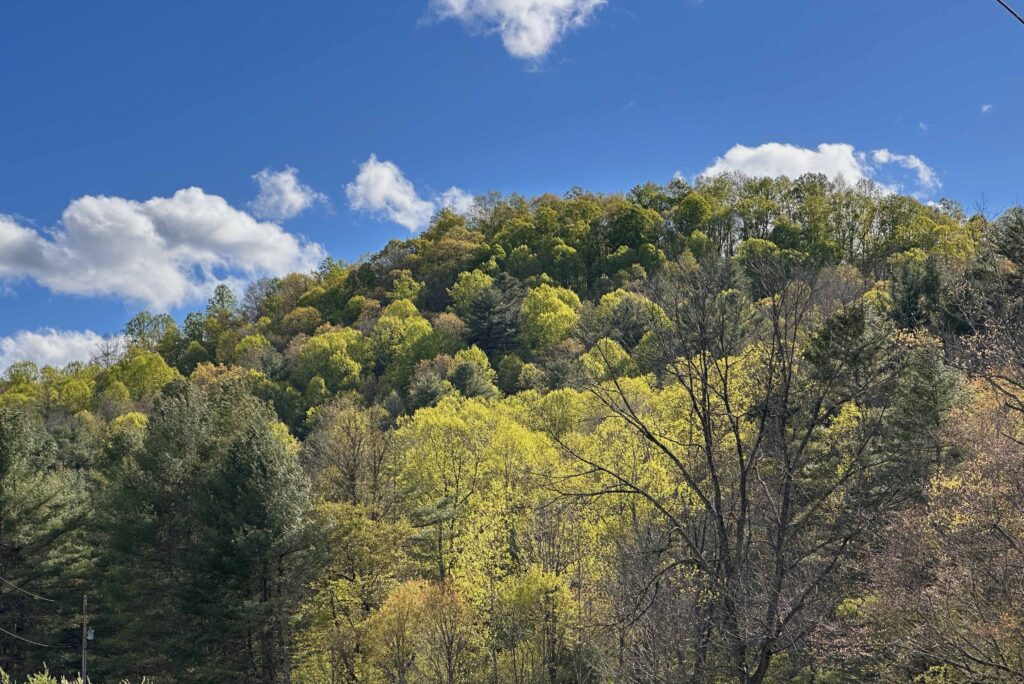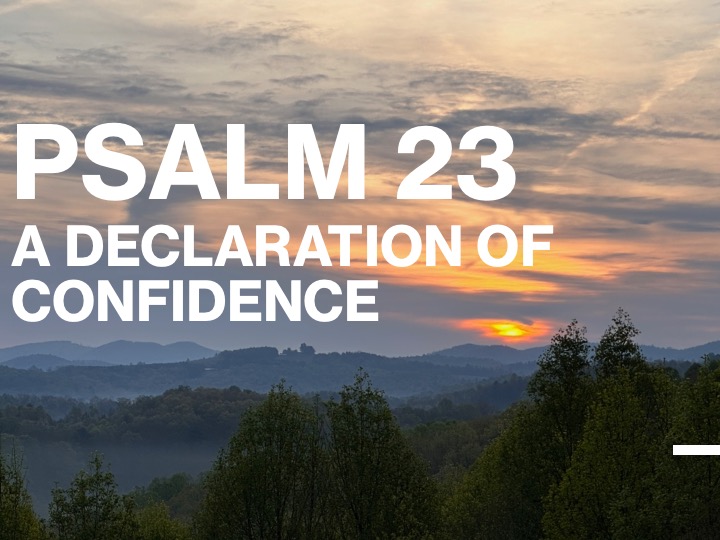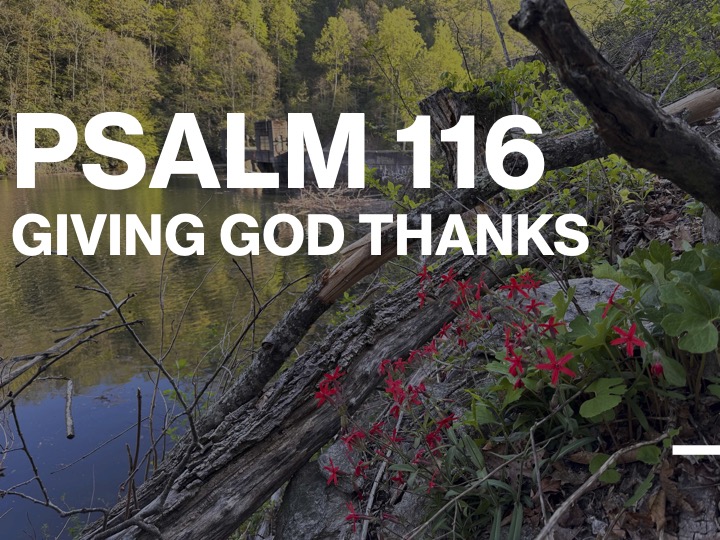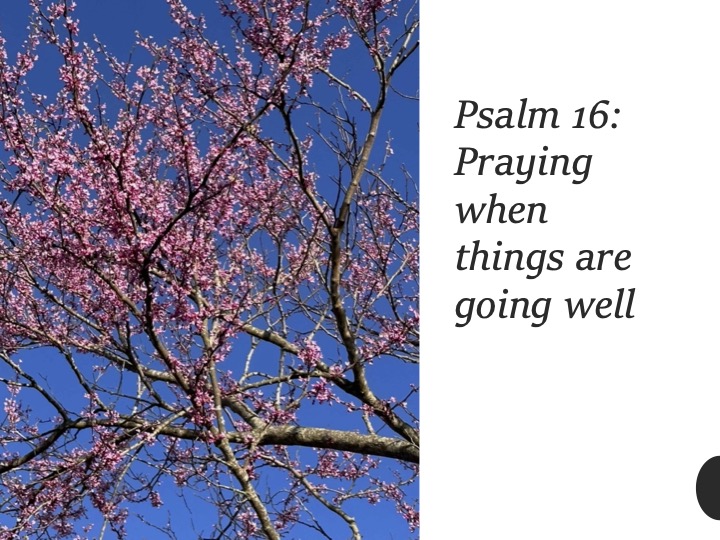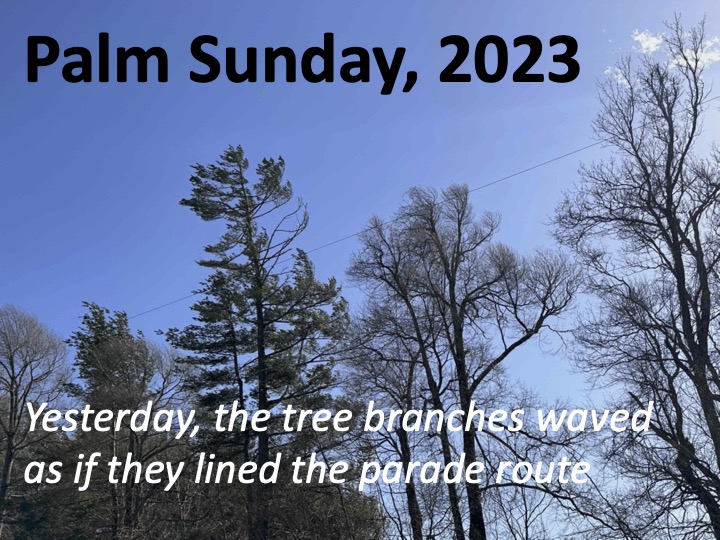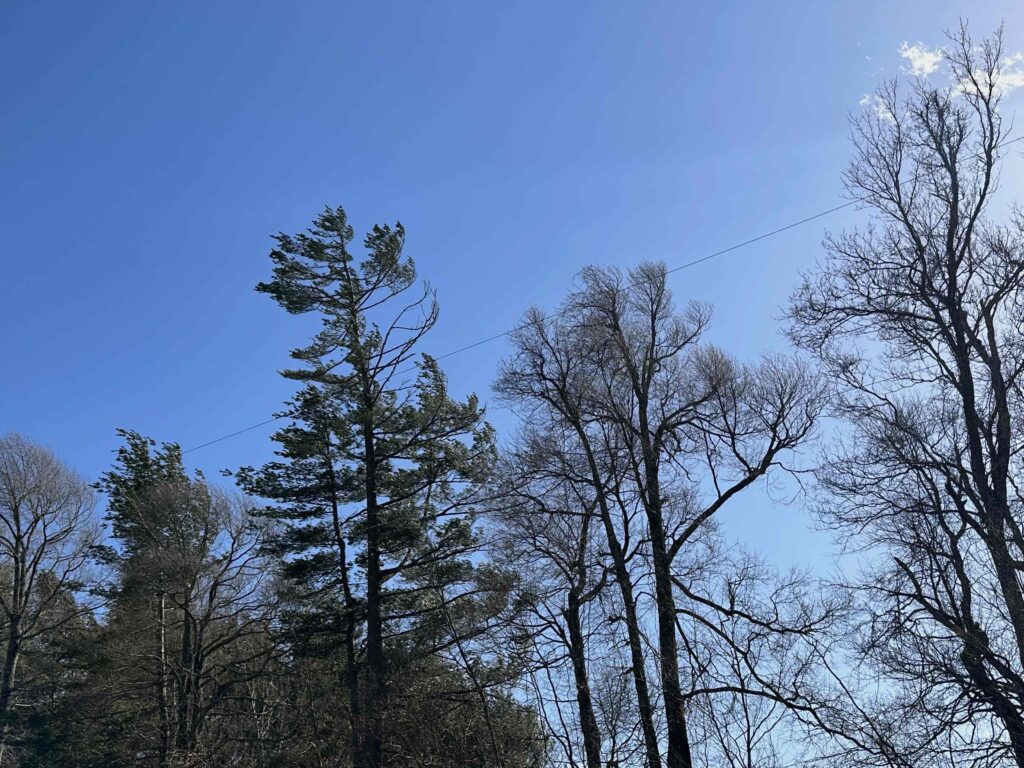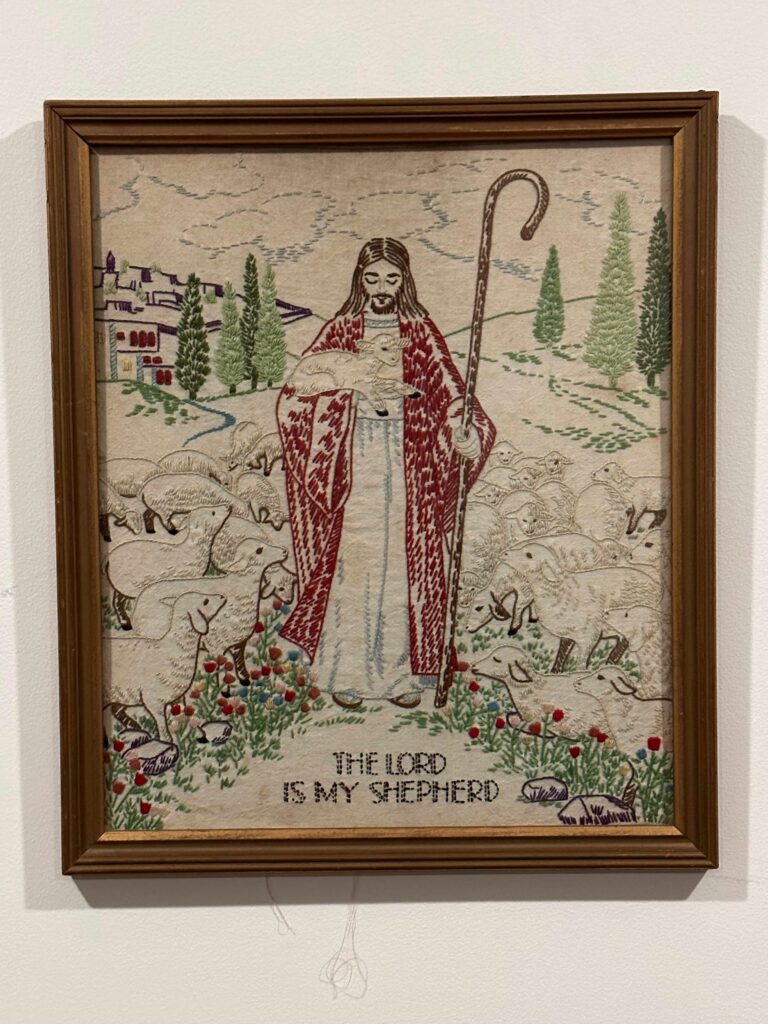Jeff Garrison
Bluemont and Mayberry Churches
May 14, 2023
Psalm 66
At the beginning of worship:
We’re family here. Jesus calls us into the church, where we are adopted as children of God and given an inheritance. Doesn’t that sound good? While we may have different abilities, we all receive an eternal inheritance. We are blessed by God.
But as it is in our earthly families, there are things we do together and things we do by ourselves. It’s no different in the church. We’re to experience God corporately and individually. We can’t just experience God one way or the other. Both are necessary for us to have abundant life. Never think that you can be a Christian without church, but always remember that a life of faith also requires individual time alone with God. Even Jesus had to get away on his own to pray.[1] Our Psalm this morning will show both sides of a life of faith.
Before reading of Scripture:
Today we’re looking at the 66th Psalm, one that begins with a processional call to worship followed by an individual’s response. In the initial call, we’re reminded of what God has done in history. In response, the shift is from the community’s praise to an individual’s act of praise for something personal. God answered the Psalmist prayer. We’re not told what problems he faced, only that God helped him get through the difficult. Therefore, like Psalm 116 which we looked at a few weeks ago, he responds to God by paying his vow.[2] He offers sacrifices and praise to the Lord.
Two parts of the Psalm
There are some who want to separate this Psalm into two parts. You kind of see this division in the lectionary, which only uses the second half of the Psalm.[3] However, I don’t agree. Yes, there are two main parts to the Psalm, but they go together.
Our faith has a community aspect to it, as well as a personal one. We see both in this passage. With the community, the Psalmist and us are called into worship. Then, our faith should be such that we not only give God thanks for blessings in history, but also for the blessings we’ve personally experienced.[4]
As you listen to the Psalm, feel how the people are called into God’s presence and then how, as an individual, the Psalmist steps forward to offer thanks.
Read Psalm 66
Growing up, my mother managed Sunday morning. She’d get up early, I think even before my dad, unless he had to be away for work. She’d fix a big breakfast: eggs, grits, bacon, toast, and coffee. Or maybe it would be pancakes stuffed with bananas or blue berries, although dad generally cooked them.
I can assure you, there no better way to wake up than to the smell of frying bacon and perking coffee. When breakfast was almost ready, she woke us kids and started countdown for when we had to be ready to leave. We’d eat breakfast generally while watching some off-key gospel singers who seemed to be ubiquitous on Sunday morning TV in the South of my childhood. At least, after listening to them, I could never complain about the music in church. After breakfast, we dressed, grabbed our Bibles, and ran out the door to make it to Sunday School on time.
Did our mom’s introduce us to Jesus?
I’m sure many of us credit our moms for making sure we attended church growing up. Of course, my dad was also there, but there were Sundays he had to work because that was when he could inspect boilers which had cooled down for the weekend. On those Sundays, my mom was totally in charge. And she got us to church on time (or close to it). Happy Mother’s Day to all the moms who stepped up to help their children grow in the faith. We’re in debt to moms and for those women who stepped in to help other children grow in their faith. We need such people in our world to makes sure that everyone has a chance to learn about Jesus.
A Procession
Psalm 66 begins with a procession. As we saw in our Call to Worship this morning, there are three parts to the gathering of people.[5] As in Psalm 100, we’re called to join in the “joyful noise,” praising God as we’re led to the temple for worship. The first four verses are all focused on this praise of God. Such praise exists not just in the people’s cries, but in all the world. I’m reminded of Jesus telling those who complained of the ruckus his followers made as they entered Jerusalem, that if they weren’t praising God, the stones would cry out.[6] God created the world to reflect his creativity and to praise his glory.
Selah
If you followed along with the Bible, you may have noticed a Selah (that I didn’t read), in the margin after the fourth verse. No one is really sure what this word means. Some think it is a symbol for music, like a clamp of a cymbal. That maybe. But here, it also marks the end of the first part of the gathering.
First invitation: “Come and See”
After praising God, it’s time to invite others to join the crowd. In verse 5, we have the first of two invitations. “Come and See what God has done.”
The Psalm then recalls the great events of the Exodus, the parting of the sea, and the Conquest, the crossing the Jordan. These were events of which the Hebrew people were familiar. But God is not just a God of the Hebrew people. God rules the nations and, as the end of verse 7 reminds us, won’t let the proud get too big for their britches by not letting the rebellious exalt themselves.
Praising God even for the hard times
Then we come upon another Selah in the margins, as we move into the third section of the opening. This third section again issues a call for praise for God has kept us among the living. Ever thought of that? Without God, there would be no life. And then we’re reminded that God keeps our feet from slipping. God is our lamp for our feet and a light to our path, as the 119th Psalm proclaims.[7] But this third section also acknowledges that life is not always rosy. God places burdens on us. We are tested. People take advantage of us. Yet, God brings us through such troubles.
Part 2: the personal praise
The second major section of the Psalm begins with verse 12 and is seen with the change of language. No longer is the focus on the plural, the community. Now an individual takes centered stage. The Psalmist comes into God’s house to pay his vows which he made when he was in trouble.
Vows
Let me say a bit about vows. We must be careful with vows. We should not make them to manipulate God. There is a horrible story in the Book of Judges about a Jephthah, an Israelite warrior who vowed that if God would give him victory, he’d sacrifice the first thing that came out of his door to greet him. It was his own daughter.[8]
Vows made for the wrong reasons can be dangerous. John Calvin taught that the only purpose of a vow is to show gratitude to God. That appears to be the intent here and is the result of the Psalmists actions.[9] A mini lesson here: don’t try to force God to act to your benefit. God is not solely on our side. Instead, to be safe, we must be on God’s side.
Second call: Come and See
After testifying to how his actions show gratitude to God, the Psalm issues his own call. The community call people to “come and see.” The individual now calls them to “come and hear.” He tells his story of how he cried out in need to God and God listened. Because of God hearing and action, he now praises the Almighty. He blesses God for God’s faithfulness.
Movement from community to personal
This Psalm shows a movement from the community to the personal. It could also go the other way, from the individual to the community, for both aspects of our faith are important. The community helps us to know God’s work in the past, but when we experience such events firsthand, it’s often in our lives.
What this Psalm also demonstrates is that for the individual and the community, the call needs to be issued for people to witness what God has done and is doing. If we don’t witness to the God of the Bible, who is also active in our lives, how will people know what God is capable of?
MOther’s sharing the good news
Thankfully, many of us have had mothers that guided us. Others of us have been blessed in sharing the good news with friends and business associates and others who cross our lives. As it is with the Psalm, we should be praising God and giving thanks for the blessings we have received, today and always. Amen.
[1] Matthew 23:36; Mark 14:32; Luke 6:12, 9:18, 22:39.
[2] https://fromarockyhillside.com/2023/04/23/psalm-116-giving-god-thanks/
[3] The lectionary doesn’t cleanly separate the Psalm, it only covers the second part, verses 8-20.
[4] The following commentaries support my thesis: James L. Mays, Psalms: Interpretation, A Bible Commentary for Teaching and Preaching (Louisville, KY: John Knox Press, 1994), 221; Artur Weiser, The Psalms: A Commentary, translated by Herbert Hartwell (1958 (German publication), Philadelphia: Westminster, 1962), 468; Claus Westermann, The Living Psalms, J. R. Porter, translator (Grand Rapids, MI: Eerdmans, 1989), 186-187,
[5] I adapted parts of Psalm 66 for today’s Call to Worship:
Pastor: Make a joyful noise to God, all the earth;
People: sing the glory of his name; give to him glorious praise!
Pastor: Come and see what God has done;
People: he his awesome in his deeds among mortals.
Pastor: Bless our God, O peoples,
People: let the sound of his praise be heard!
[6] Luke 19:39-40.
[7] Psalm 119:105.
[8] Judges 11:29-40.
[9] John Calvin, Institutes of the Christian Religion IV.13.1-7. See also Stan Mast’s commentary on this passage: https://cepreaching.org/commentary/2017-05-15/psalm-668-20/
